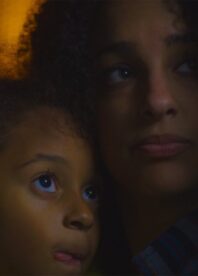
Power is everywhere; it’s in a mother’s love and it’s also in the institutions that she’s up against. ImagineNATIVE festival comes back this year with eleven whopping short programs, three of which I’ll be writing about. Its third short program, A Mother’s Love, takes its viewers to see the experiences of Indigenous women worldwide. First is from the various First Nations of Turtle Island (North America). It then shows us the experiences of Maori people of Aotearoa (New Zealand) and the people of Yakutia (in Far Eastern Russia). Many of the shorts here show mothers in the traditional sense but some have women stepping up. Society assigns women as caregivers, a role they reluctantly but lovingly take on.
I started with Tahuaroa Ohia’s He Karu, He Taringa. Here, a Maori mother (Tuakoi Ohia) takes her son, Ben, to specialists after he acts out in school. The visual effects to express Ben’s reactions to the world around them are intentionally childlike. Honestly, the effects makes me feel ambivalent about the final product. It may lack in form but it compensates with content. It shows that there are improvements to how New Zealand’s healthcare system improves to help Maori children and their mothers, but how even a diverse staff can only do so much to help those in need.
I don’t know in what order to watch these in, so I followed that short up with Elijah Alexander Chenoweth’s Entre Nous Locataires. This is a straightforward interview documentary short where the director talks to his mother and diverse group of women. These women lived in and raising their children in the Alma Blackwell Co-Op of Vancouver. This co-op helps women and children leave abusive situations, and it’s in danger of developers taking over and demolishing it. This is the rawest of the shorts so far, showing the hallmarks of proletarian cinema in mostly good ways.
Powerful emotions abound in the next short, Aykuo, where two Yakutian women mourn their mother and eventually, each other. The premise itself is soapy, as well as the subplot where one sister apologizes for being a sexual assault victim. Many people in the West will not understand that perspective but it handles that topic with nuance. There are a few twists to this short, the first being the segments when the women express their emotions through throat singing, reminding us of the connective tissue between Indigenous people in Yakutia and Inuit people of Turtle Island. I’m also just gonna show up every time a movie visually references Tarkovsky.
Next up is Camping from Indigenous director, producer, and writer Derek Quick. Just like a few of the shorts in this program, he uses this one to address intersectional issues. His protagonist is Emma (Raven Miles). She tries to keep appearances for her daughter Gia, even if she has to keep the latter around with her as a ride share driver. Just like Emma and Gia, the cast is mostly Black. And it’s interesting to me that the Black male security guard is more compassionate with her than a Black female passenger. But that’s what makes this short special. That it goes against the grain and shows us that reacting to certain people is an induvial response instead of an archetypal one.
The last short available to me at the time I’m reviewing this programme is the sky is very pretty, an obviously ironic title for a short about women who temporarily don’t have their freedom. It’s an Amerindian woman’s turn to make a meal for the rest of the co-op where women and children reside. As she makes this meal, she talks about her fear of going outside, the new normal for women who have to go to Mexico from Honduras and other countries in Central America where sexual violence is rampant. I put my bias hat on when one of the children sings a Selena Quintinilla song. But perhaps it’s that mix of gravitas and levity that makes this my favourite of the program.
- Genre: Documentary, Drama, Music
- Release Date: 10/18/2023
- Directed by: Aracely Méndez, Ayaal Adamov, Derek Quick, Elijah Alexander Chenoweth, Lindsay McIntyre, Tahuaroa Ohia
- Starring: Raven Miles, Tuakoi Ohia
- Produced by: Derek Quick, Libby Hakaraia, Pavel Sarychev
- Written by: Derek Quick, Tahuaroa Ohia

